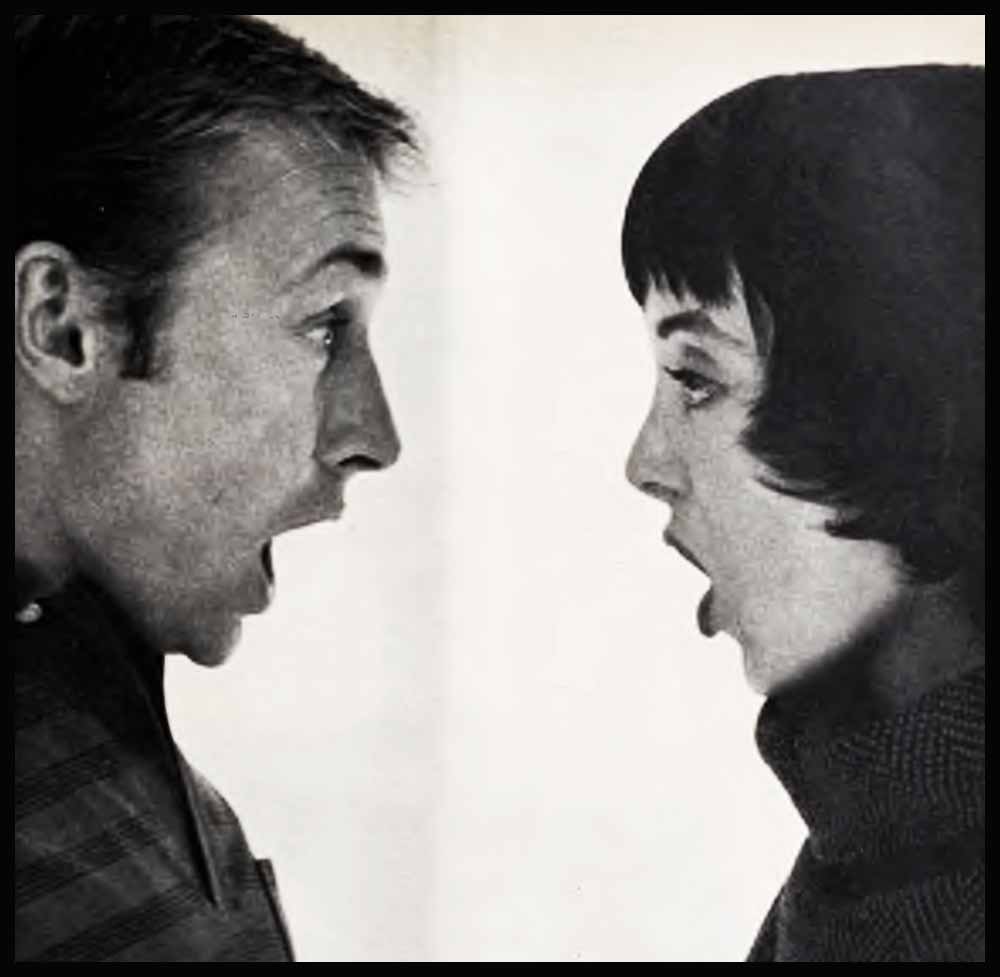
Don’t Be Difficult Or 7 Wonderful Ways To Mess-Up A Romance
You think Nick and I are kidding in the pictures on these pages? Well, we were—but if you’ve never been caught in similar poses yourself, you’re a rare female,” said Carolyn Jones between picture takes. “If you’ve got time, I’ve lots of opinions on how to and how not to treat the man in your life. Okay?
“I believe in basics and, thank heavens, so does my husband Aaron Spelling. We feel you have to strip all the long-winded jazz off living and come right back to basics. But please,” she added with a wave of her hand, “don’t get the idea we hit on a ‘philosophy of love’ right at the start. We hated each other immediately (possibly because when I met him, I couldn’t believe he was the grand and glamorous drama teacher and director I’d been hearing about and promptly introduced myself to the wrong man!). Anyway, as you can see, it wasn’t love at first sight—which was lucky, in a way, because we discovered one another’s faults at the beginning—before we saw the virtues. But one thing I think I always knew—if the male isn’t the stronger, it’s the female’s fault!”
She tucked her feet under her, “Sitting Bull” fashion and went on. “You know, we females have mixed up the right to vote with the demand that, if wifey works, her husband should be glad to do the dishes and clean the birdcage while she flops in the living room and watches TV. This kind of attitude does not lead to keeping the male strong.
“Which brings me to one of the ways women strip that male ego. Working. When I was at Amarillo High, I had a disc-jockey show on radio. It was corny, but I earned some money. Most girls today, in the summer, or after school earn money. To me, that taste of money gave me a feeling of independence and security within myself. By the time we marry we’re in one of two boats. Either we want to quit working or we have made a career and want to keep on working for economic reasons and to fulfill ourselves. Now the catch. How do we think about working? What attitude do we take toward our males because of it?

MORAL: Positively see that he never gets a chance to talk—that’s a woman’s prerogative.
“When Aaron and I married in April of ’53 we were both flat broke. But we believed in ourselves and each other. We had to go to Dallas. Aaron’s father was very ill and I was supposed to be there on a personal appearance for ‘House of Wax.’ We had $1.92 between us. Aaron was morose and apologizing for not being a success. And I told him what I think any girl who plans to work after marriage should tell her male. ‘I didn’t marry you for a meal ticket, I didn’t marry you for money or so I could quit work.’
“Working doesn’t have to wreck a marriage by destroying a man’s ego. Working wives can make better companions, if their attitude is right. After all, companionship is the basis for marriage. A working wife can be interesting if she lets herself be, instead of growling about her tiredness.

SHE: Must you blow cigarette smoke in my face? The air’s so thick, I think I’m going to faint!
MORAL: Be sure he knows you know all his habits—and what’s more, that you disapprove!
“Don’t try to change your man. Women are notorious for choosing the wrong man and trying to change him. It hardly ever works out that way so, decide before you marry—either you like him the way he is or you change. Particularly, in early dating stages, we seem to reach out to the wrong male, mostly because of our background, I guess. I know,” Carolyn said, “because this is my second marriage. I was very young. Nothing is as blind as an adolescent’s need for love. Other teenage girls needn’t have a broken marriage if they can be smarter than I was. When you’re sure this is it, ask yourself these questions: Will we have a fuller life together than separately? Do we have mutual respect for our individual personalities? Do our personalities complement each other? Is he your closest friend? Even if you work, can you come home and be wife, friend and companion?
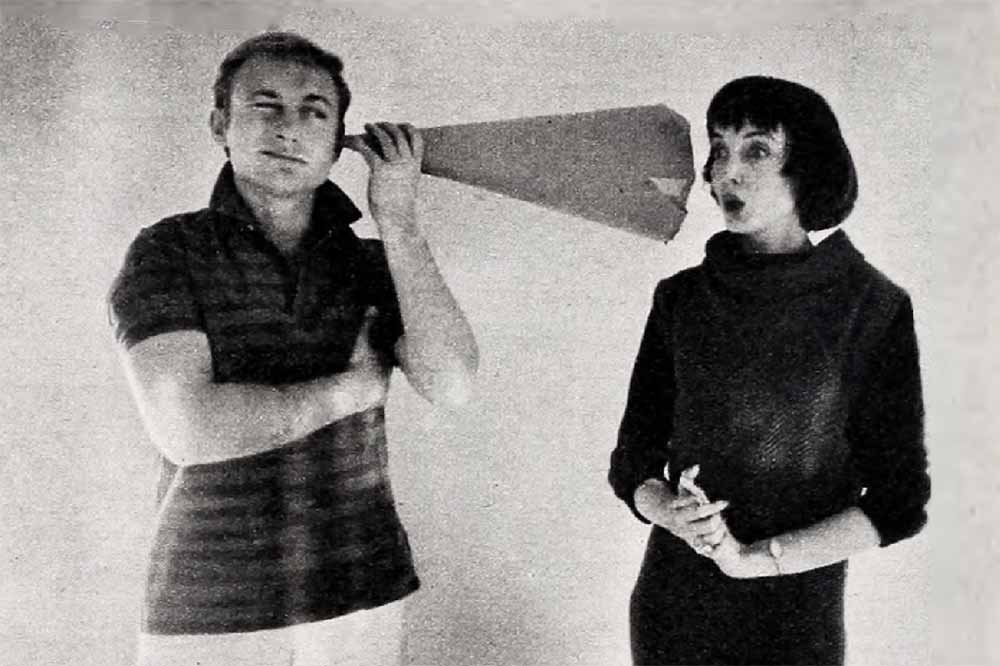
HE: But honey . . .
SHE: Do you have to go to the fights with the boys? Those mean old fights are always taking you away!
HE: But honey . . .
MORAL: Go right ahead. Be the helpless female—be a clinging vine and you’ll soon have nothing to cling to but your scrapbook and some old memories.
“I’m grateful to my first husband.” Her unseeing eyes stared into the late afternoon gloom. Her restless fingers were still. “He taught me what to look for and what I needed for a happy marriage. He made me ready for Aaron. I never fitted as an equal, or even near it, with my first husband. We didn’t share all the little things that go into living. We weren’t really friends.
“The cruel thing is my experience was not unusual. In fact, it’s too usual. It’s easy in searching for understanding to mistake it for friendship and love. That’s why both my roles in ‘Bachelor Party’ and ‘Marjorie Morningstar’ brought identification and reaction. Which brings up the all-important point, I think. Backgrounds certainly don’t have to be exactly alike, but they must be similar enough to blend for lasting understanding and marriage. For instance, my background. I never had a normal childhood, which has made me very aware in some areas and very blind in others.” She sat deep in remembering watching the smoke from her cigarette spiral lazily. . . .
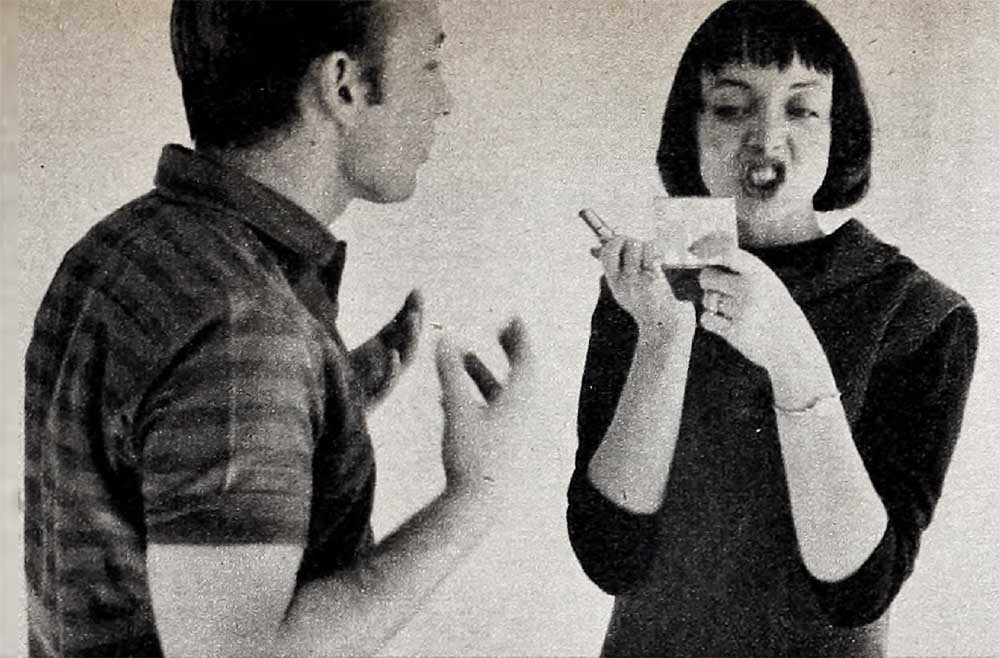
SHE: I must have been out of my mind to buy this shade of lipstick! Makes me look like a corpse.
HE: If it was August, I wouldn’t mind—but January!
SHE: It looks pink but the label says “Vampire Red.”
MORAL: Never listen to his troubles, just concentrate on your own—they’re more important anyway!
The doctor placed the oxygen mask over the thin, tiny face. She lay fighting for breath, gasping, wheezing, choking. She was seven. Her mother, grandmother and step grandfather stood outside the hospital room, waiting. The oxygen coursed through her lungs and the small body stopped struggling and relaxed. Another asthma attack had been allayed. The place, Des Moines, Iowa. After her father died in Amarillo—while her younger sister, Betty, was on the way—her mother went home to Des Moines to live. C. H. Baker, Carolyn’s step grandfather, became Dad to her. He deserved the name. Because of him, the scrawny, sickly little girl lived. A victim of colds, pneumonia and emergency trips to the hospital for asthma attacks, Carolyn’s only security was in Dad. She was in and out of school so much she never felt she belonged. She never could enter into games and didn’t have time to make friends. Sensitive and shy, she felt others didn’t like her. She retreated. She started reading with a vengeance. She devoured books. Her love for acting, developed as with each new book she secretly became its heroine. Deeply sensitive to things and people, she would get angry, sit and hold a grudge. Adults called her precocious. She learned to elbow her way into an adult group and show off her reading ability. At nine, she informed Dad that she would be an actress. He agreed. After she finished high school.
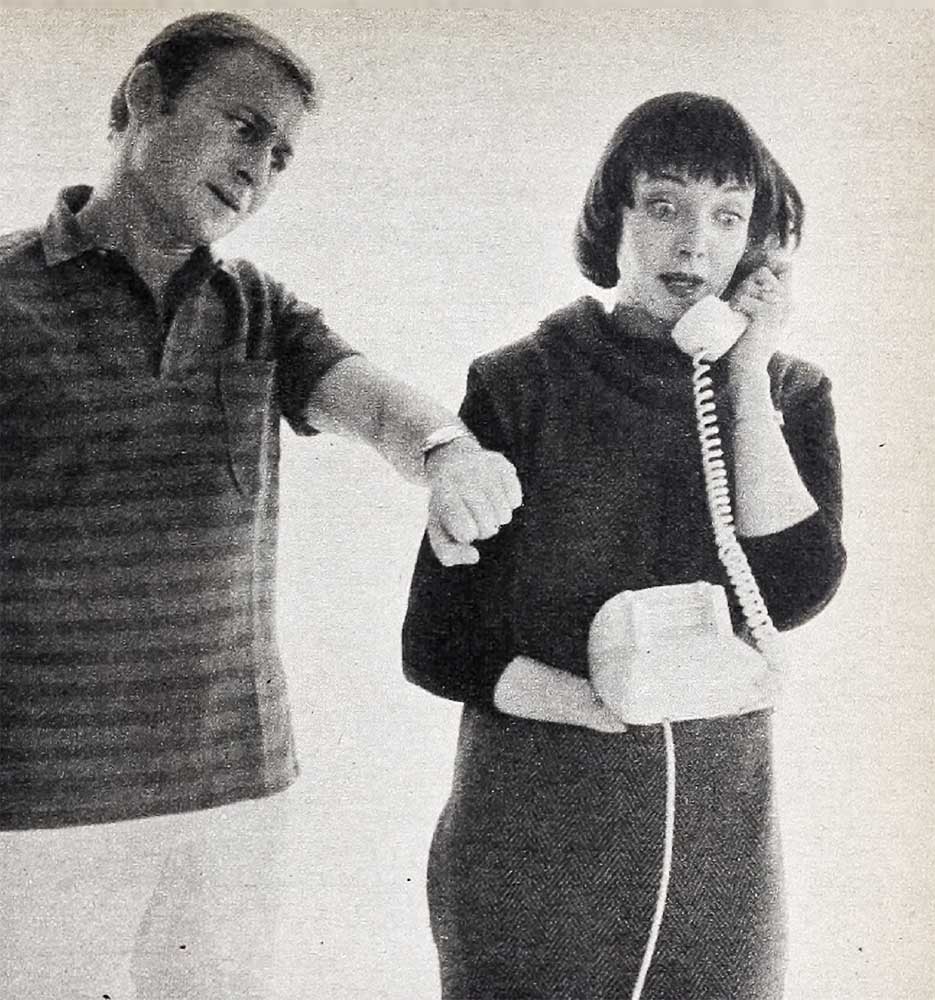
HE: Come on, we’re an hour late already.
MORAL: Don’t hang up! Give him the idea he’s going to spend his life with your friends.
When Carolyn was nine, her step grandfather was offered the district manager job of his company, either in Chicago or Amarillo. The Chicago job paid a lot more money. But the doctors had said Carolyn wouldn’t live till fifteen in that climate, so he took his family back to Texas. Because of her vast reading she flipped through high school and graduated at fifteen. She had no relations with the other kids. She was bent on Pasadena Playhouse. So at fifteen, she lied about her age and was accepted at the Playhouse. Just before graduation, Paramount saw her in “Summer and Smoke” and promptly signed her to a long-term contract. She did “The Turning Point,” “Military Policeman” and the “Road to Bali” before movie production nose-dived in 1952. Along with top stars, Carolyn found herself on the outside looking in.
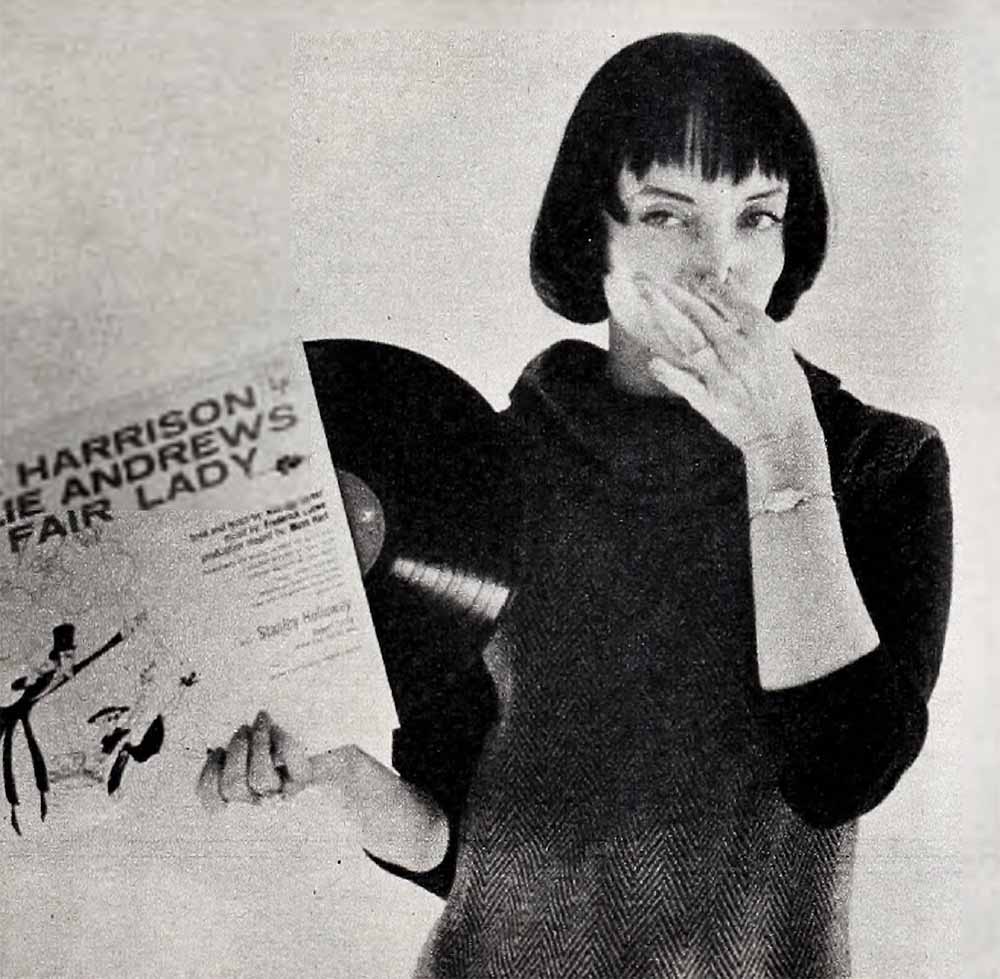
SHE: Once and for all—I don t like rock ’n’ roll!!
MORAL: Stay dumb! Avoid all his interests.
“Actually it was this mixed-up background that sparked Aaron’s interest in me,” admitted Carolyn with typical frankness. “One evening in the Playhouse, despite the director in Aaron, he asked me to do a play. I accepted. After rehearsal, we all went out for for hamburgers and we happened to sit next to one another. He suggested we play a game. He threw a line from a play and we were to tell him what play it was from. The rest of the kids didn’t know, but I sat there throwing all the plays I’d read as a child right back at him with a vengeance. He looked at me with dawning respect. Both our attitudes changed that night.
“I believe that love—at least for a woman—begins with mental, not physical attraction. If interest in a person starts this way, then all other things follow naturally.
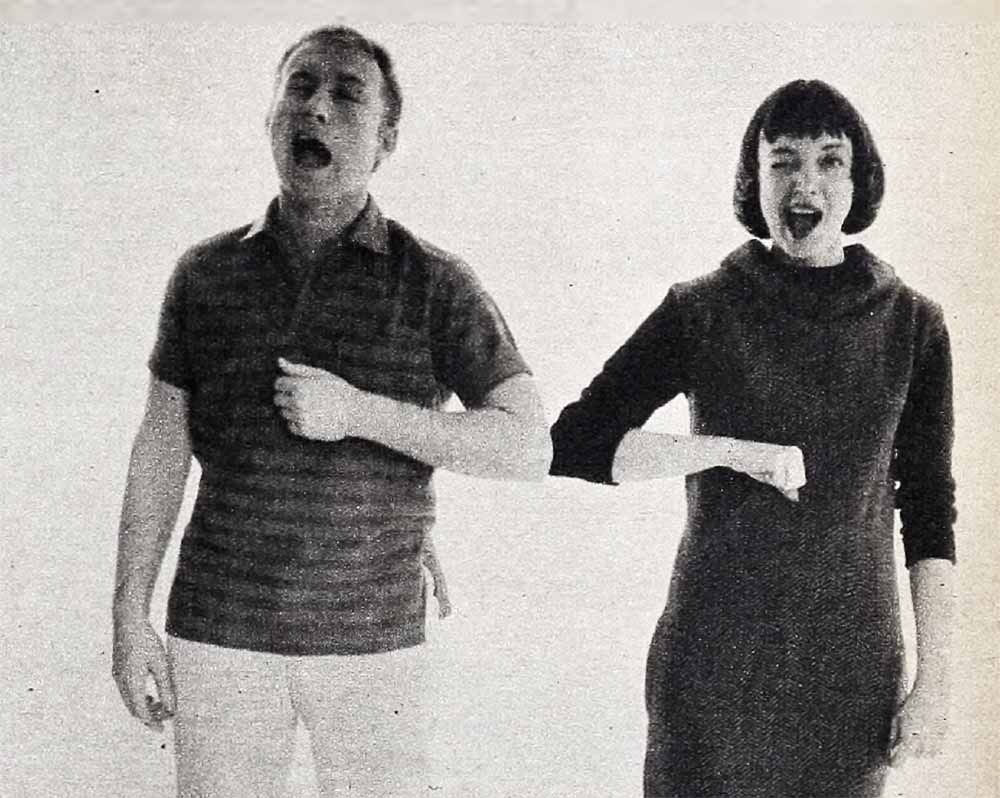
SHE: If you think that’s good, wait till you hear what Nat told me today! It seems . . .
MORAL: Always top his jokes and stomp on his witty remarks. Remember—anything he can do, you can do better—much better.
“Being a creator, Aaron is a nervous set of strings. He has insecurities that stem from childhood. He’s a worry wart and though he’s becoming a top name in writing, working on four Scripts at a time is not enough. He feels he should do more. We’re both emotional, but I feel it’s his prerogative to let go, have a snit. It’s good for him. And as I like him, I’d like to have him around for a while. So most of the time I exude confidence and a ‘don’t be silly’ attitude, to reassure him. He’s wanted. He’s needed. He is and I let him know it. all men, in various ways, need that same assurance. You have to know your man, to feed his ego. Sometimes the blusterers and the braggarts need it most. Fortunately, Aaron is not devious.
“A girl should remember that all men deep down are afraid of life too. When they offer their trust and innermost thoughts to a girl they love, they have a right to have that trust treated tenderly and with loving care, not to be used to strip their ego in anger or ignorance. It’s part of a woman’s job to protect her man’s ego.”
Carolyn grinned and admitted, “Understanding is not a one-way street. When I flip, I go all the way. As long as I’m healthy, I feel strong and secure. But the minute I’m sick, I become a quivering mass of hysterical neuroses. When that happens, Aaron immediately takes over; assumes all responsibilities and becomes my strength. And that’s the way it should be—balancing strength and weakness for each other. But remember, don’t take advantage of your female prerogatives—clinging vines are as bad as the domineering wife.
“Understanding and accepting faults, even learning to live with them is important. For instance, Aaron drives me mad by digging his sharp elbow into my ribs in the middle of the night and saying, ‘Honey, I’ve got a great idea.’ Then he spends half the night telling me about it. This fault I have accepted, but I am considering getting a foam rubber chemise for sleeping. He also never hangs up his clothes. At first I just watched the bedroom chair pile higher and higher. Finally, I decided it would be easier to do the hanging myself. I believe a man has a right to some faults and obsessions. I’ve got a few I’d like to keep, too.
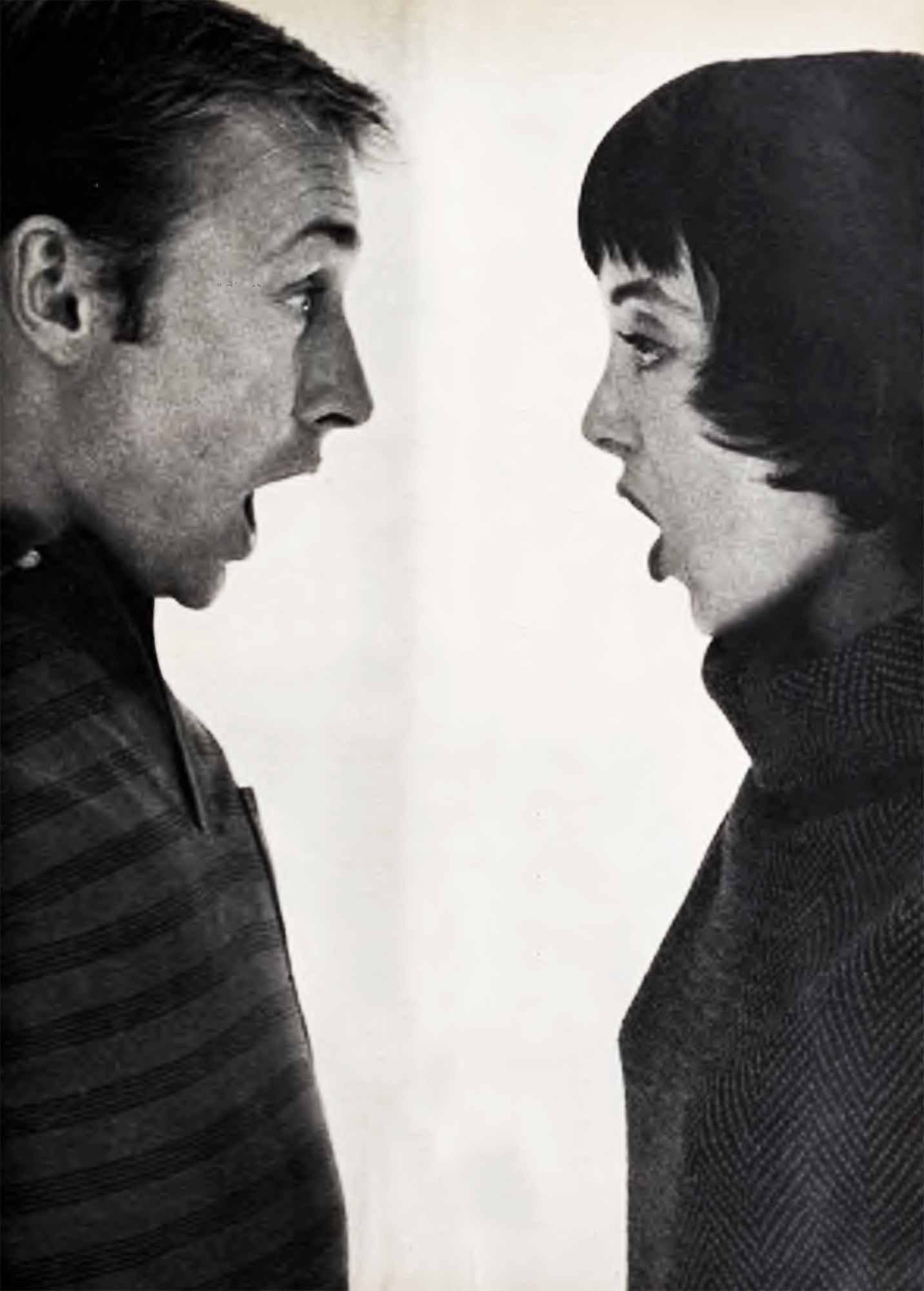
“We disagree sometimes. We’ve been coldly infuriated with one another. But I never use it to strip his ego. We’ve had to learn to live with each other. He had a jolly little habit when we first got married. He’d wait till we were out with people and then open up on my foibles. And I looked like a schmo. I told him he’d regret it, but he kept it up. One time at a party he did it again. Making the cracks and getting in his licks. I went right on laughing and talking. The fellow that took us home knew me well. He said, ‘Boy, Aaron, you’re in trouble.’ I waited until we hit the house alone, and then I really let him have it. I can’t argue in front of people, but I can sure hold my own in private. And, I’m proud to say, Aaron can, too, when his rights need preserving.
“I hope he’s living proof that I believe in not stripping the male ego,” Carolyn said happily. “I believe any girl who thinks right can make a man happy. By asking herself strong questions when she thinks she’s in love, always putting her man first and letting the idea of women’s rights go to blazes. Kids just dating may want to remember my four basics; Love, security, health and ego. If love is a sweet, natural, precious thing of giving and receiving, then the others should follow. But when a woman messes around with any of these, she’s in trouble.”
THE END
CAROLYN’S IN PARAMOUNT’S “RING CREOLE.”
It is a quote. PHOTOPLAY MAGAZINE JULY 1958





No Comments